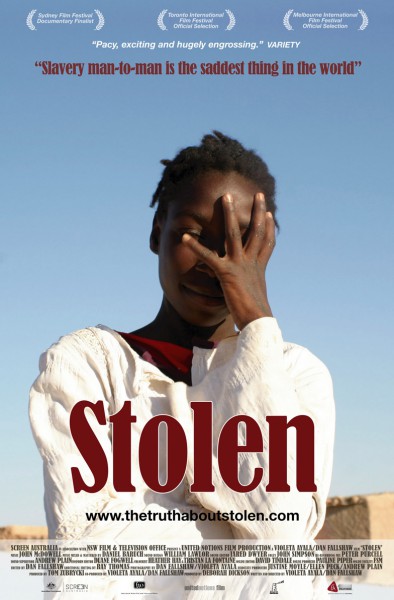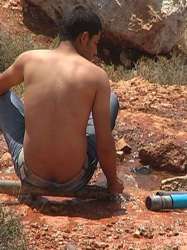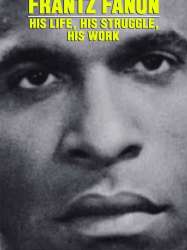Stolen is a film of genre Documentary directed by Dan Fallshaw
Stolen (2009)

If you like this film, let us know!
Length 1h18
Genres Documentary
Themes Films set in Africa, Films about slavery, Documentary films about law, Documentaire sur une personnalité
Rating67%










Stolen is a 2009 Australian documentary film that uncovers slavery in the Sahrawi refugee camps controlled by the Polisario Front located in Algeria and in the disputed territory of Western Sahara controlled by Morocco, written and directed by Violeta Ayala and Dan Fallshaw. It had its world premiere at the 2009 Sydney Film Festival, where a controversy started after one of the participants in the documentary, Fetim, a black Sahrawi, was flown to Australia by the Polisario Liberation Front to say she wasn't a slave. The POLISARIO, avowing that it doesn’t condone slavery and needing to safeguard its image on the world stage to support its independence fight, began an international campaign against the film. It put out its own video denouncing Stolen, in which several people who Ayala and Fallshaw interviewed say they were coerced or paid by the Australian duo. On May the 2nd 2007, while filming in the refugee camps Ayala and Fallshaw were detained by the Polisario Front and Minurso and the Australian ministry of foreign affairs negotiated their release. "The Polisario Front officials criticised the interest the two journalists took in black members of the Sahrawi population, Reporters Without Borders has learned. Ayala told the press freedom organisation that she saw cases of enslavement. “The fact that they are fighting for their independence does not mean that Polisario’s leaders can allow themselves to commit such human rights violations,” she said. “It is our duty as journalists to denounce such practices. We originally went there to work on the problem of separated families. But during our stay, we witnessed scenes of slavery.”
In 2008 Human Rights Watch published a report confirming that vestiges of slavery still affects the black minority in the Polisario refugee camps and in Western Sahara, the report included a manumission document signed by the POLISARIO’s Ministry of Religious and Cultural Affairs.
Stolen has screened in more than 80 film festivals worldwide including 2009 Toronto International Film Festival, IDFA, Seattle IFF, Stranger Than Fiction, Glasgow Film Festival, MIFF, One World Film Festival, Docaviv, It's All True, Singapore IFF, Cleveland IFF, Norwegian Short Film Festival, Frontline Club Liberation Season, and Amnesty International Film Festival.
Stolen television premiere on PBS World as part of the Afropop Series hosted by Academy Award nominee actress Gabourey Sidibe was initially scheduled for February 5, 2013. Due to the controversy around the film, the broadcast was pushed back. "There’s been significant pressure placed on PBS to not show "Stolen" from US-based lobbyists (US law firm Foley Hoag have been paid the best part of $1,000,000 annually by the Algerian government since 2007 to lobby in the US on issues related to Western Sahara) for the Algerian government, who back the Polisario. It was this pressure on PBS that prompted WGBH to carry out their own investigation and present the "Stolen" two-hour special".
Stolen premiered nationwide on February 26 on PBS, 2013 with a special report carried by journalist Phillip Martin that included an interview led by WGBH journalist Callie Crossley with the directors, followed by a panel discussion whether slavery exists in Western Sahara with Eric Goldstein (Deputy Director, Middle East and North Africa Division Human Rights Watch), Madeline Campbell (Professor of Urban Studies, Worcester State University) and Bakary Tandia (Mauritanian Anti-Slavery Activist).
Comments
Leave comment :
Suggestions of similar film to Stolen
There are 0 films with the same director, 8962 with the same cinematographic genres, 4208 films with the same themes (including 2 films with the same 4 themes than Stolen), to have finally 70 suggestions of similar films.If you liked Stolen, you will probably like those similar films :

500 Years Later (2005)
, 1h48Directed by Owen 'Alik Shahadah
Genres Documentary
Themes Films set in Africa, Films about slavery, Films about racism, Documentary films about racism, Documentary films about law, Documentary films about historical events, Documentaire sur une personnalité, Documentary films about politics, Political films
Actors Bill Cosby, M. K. Asante, Nelson George
Rating68%





The film visits five continents, and over twenty countries while charting the legacy of slavery and identifies a direct, or indirect link to crime, drugs, HIV/AIDS, poor education, inferiority complex, low expectations, poverty, corruption, poor health, and underdevelopment to African people globally.

Motherland (2010)
, 1h58Directed by Owen 'Alik Shahadah
Origin USA
Genres Documentary
Themes Films set in Africa, Films about slavery, Films about racism, Documentary films about racism, Documentary films about law, Documentary films about historical events, Documentaire sur une personnalité, Documentary films about politics, Political films
Actors Harry Belafonte, Abdulkadir Ahmed Said
Rating82%





Motherland is an epic documentary about the African continent from Ancient Egypt to the present. It is an overview of African history and contemporary issues but with the African people at the centre of the story. It is one of the first Pan-African features to be made.

At the Green Line (2005)
, 52minutesOrigin Israel
Genres Documentary
Themes Films set in Africa, Films about religion, Documentary films about law, Documentary films about war, Documentary films about historical events, Documentaire sur une personnalité, Documentary films about politics, Documentary films about religion, Political films, Films about Jews and Judaism

The Colour of Olives (2006)
, 1h37Directed by Carolina Rivas
Origin Israel
Genres Documentary
Themes Films set in Africa, Films about families, Films about religion, Documentary films about law, Documentary films about war, Documentary films about historical events, Documentaire sur une personnalité, Documentary films about politics, Documentary films about religion, Political films, Films about Jews and Judaism
Rating70%





 , 1h26
, 1h26Origin USA
Genres Documentary, Historical
Themes Films about slavery, Films about racism, Documentary films about racism, Documentary films about law, Documentary films about historical events, Documentaire sur une personnalité
Rating68%





The film focuses on the descendants of the DeWolf family, a prominent slave trading family from Rhode Island from 1769 to 1820, and the legacy of the slave trade in the North of the United States. The film follows ten family members as they retrace the triangle trade starting at Linden Place in Bristol, Rhode Island, the hometown of the DeWolfs. The family has been prominent in local businesses and banking, as academics, in the local Episcopal and other institutions, and organizing the Bristol Fourth of July Parade. The film goes with the family to Ghana, where the slaves were purchased and where they meet with current residents, and to Cuba, where James DeWolf owned three sugar and coffee plantations in the 19th century.

Loyalties (1999)
Genres Documentary
Themes Films about slavery, Films about racism, Documentary films about racism, Documentary films about law, Documentary films about historical events, Documentaire sur une personnalité

Interrupted Streams (2010)
, 1h15Origin Israel
Genres Documentary
Themes Films set in Africa, Environmental films, Films about religion, Documentary films about law, Documentary films about environmental issues, Documentary films about war, Documentary films about historical events, Documentaire sur une personnalité, Documentary films about politics, Documentary films about religion, Political films, Films about Jews and Judaism
Paths of lives are crossed in one village in the West Bank. Along the broken water pipelines, villagers walk on their courses towards an indefinite future. Israel that controls the water, supplies only a small amount of water, and when the water streams are not certain nothing can evolve. The control over the water pressure not only dominates every aspect of life but also dominates the spirit. Bil-in, without spring water, is one of the first villages of the West Bank where a modern water infrastructure was set up. Many villagers took it as a sign of progress, others as a source of bitterness. The pipe-water was used to influence the people so they would co-operate with Israel’s intelligence. The rip tore down the village. Returning to the ancient technique of collecting rainwater-using pits could be the villagers’ way to express independence but the relations between people will doubtfully be healed.

Redlight (2009)
Directed by Adi Ezroni
Origin USA
Genres Documentary, Crime
Themes Films about children, Films about slavery, Films about sexuality, Erotic films, Films about pedophilia, Films about prostitution, Documentary films about law, Documentaire sur une personnalité, Documentary films about prostitution, Documentary films about child abuse, Films about child abuse
Actors Lucy Liu, Reena
Rating73%





 , 52minutes
, 52minutesOrigin Algerie
Genres Documentary
Themes Films set in Africa, Films about writers, Documentary films about law, Documentary films about historical events, Documentaire sur une personnalité, Documentary films about politics, Political films
This movie depicts Frantz Fanon's life. A psychiatrist from Martinique, he became a spokesman for the anti-colonialist struggle. In 1952, Frantz Fanon wrote Black Skin, White Masks, an analysis of racism and the ways in which its victims internalize it. In the 50s, he aided the rebels of the Algerian anti-colonial war. Expelled from Algeria in 1956, he moved to Tunis, Tunisia, where he wrote for the rebel newspaper El Moudjahid, founded one of Africa's first psychiatric clinics and wrote several books on decolonization. He died from leukemia in Washington, D.C., at the age of 36.

Screamers (2006)
, 1h29Origin USA
Genres Documentary
Themes Films set in Africa, Films about racism, Documentary films about racism, Documentary films about law, Documentary films about war, Documentary films about historical events, Documentaire sur une personnalité, Documentary films about politics, Political films
Actors Shavo Odadjian
Rating58%





 Connection
Connection